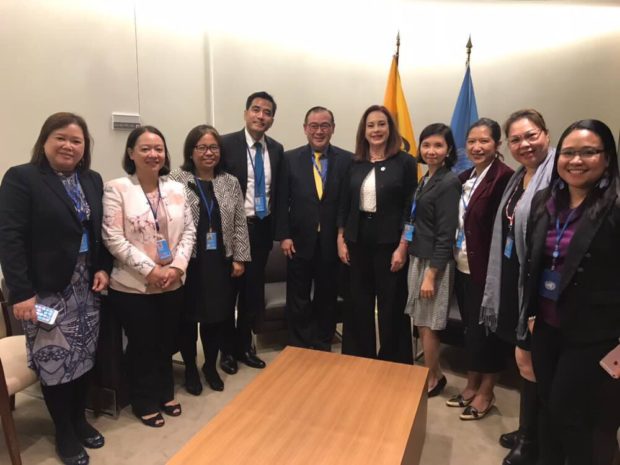
The Philippine Delegation to the United Nations led by Permanent Rep, Teodoro T. Locsin Jr. (fifth from left) with Maria Fernanda Espinosa of Ecuador (sixth from left), president of the UN General Assembly, after the Philippines won its bid for a seat in the UN Human Rights Council during elections in New York on Friday. (Photo from the Department of Foreign Affairs)
The Philippines has been elected to the United Nations Human Rights Council (UNHRC) despite rights groups’ complaints that a government widely condemned internationally for a brutal war on drugs doesn’t belong in a group meant to call out abuses.
The country’s election on Friday through an uncontested balloting in the UN General Assembly “puts pressure” on the administration of President Rodrigo Duterte to “address numerous allegations of rights violations,” the Commission on Human Rights (CHR) said.
Fierce lobbying ahead of the vote by Iceland against Manila’s inclusion fell short with the Philippines making it to the 47-member council along with 17 other new members.
Malacañang and former Foreign Secretary Alan Peter Cayetano said the country’s election to the UNHRC was “a repudiation” of critics of the President’s brutal war on drugs.
“The Philippines’ election … is a recognition that our government respects human rights and will not tolerate abuse by those in authority,” said Salvador Panelo, presidential spokesperson and chief legal counsel.
‘Vindication’
“Getting a seat in the [UNHRC] is a repudiation of the critics and detractors on the President’s unrelenting war [on] illegal drugs,” he added.
Cayetano described the fresh mandate from the UN General Assembly as a “vindication” of the President’s antinarcotics campaign.
“Our successful bid to keep our seat in the council is proof that the Philippines respects and protects human rights, and has seen through the efforts of some to politicize and weaponize the issue,” he said.
‘Killing frenzy’
Earlier, the New York-based Human Rights Watch (HRW) wrote to the United Nations and asked its member nations to keep the Philippines and several other countries out of the council.
The rights group accused the Duterte administration of conducting a bloody campaign that, it said, had left thousands of drug suspects dead in a “killing frenzy.”
By the administration’s own account, some 4,800 suspects have died in clashes with police. But HRW and other groups claim the death toll is much higher.
The President has denied conducting unlawful police killings, although he has repeatedly threatened death to drug dealers.
In a statement on Saturday, the CHR said that with a fresh mandate in the council the government would have to address the issue of extrajudicial killings in its take-no-prisoners war on drugs.
Credibility
“The Philippines’ credibility to be part of this body rests on its ability to effect actions that will concretely address these allegations…” CHR spokesperson Jacqueline Ann de Guia said.
The Philippines garnered 165 votes from the 192 cast by UN member states and would serve another three-year term in the council starting next year, according to the country’s ambassador to the United Nations and incoming Foreign Secretary Teodoro “Teddy Boy” Locsin Jr.
The country’s representative to the Geneva, Switzerland-based council serves as vice president for Asia Pacific for the 2015-2018 term.
Hours before the vote, Cayetano slammed Iceland, HRW and other nongovernment groups for calling on other countries not to support Manila’s reelection bid.
“Even the noisiest one against us, which is Iceland, do you know the number of problems of Iceland in human rights? It’s domestic violence. They’re very noisy toward us, but all the while their kind of violence is at home, which is the worst kind of violence because your home is supposed to be your castle,” he said.
‘Hypocritical’
The election of six countries, including the Philippines, sparked sharp criticism from rights groups and the United States.
Nikki Haley, who this week announced her resignation as US ambassador to the United Nations, said Friday’s vote demonstrated why the United States was right to withdraw from the council, which Washington called a “hypocritical” body that “makes a mockery of human rights.”
For the first time since the council was created in 2006, each voting region agreed in advance on 18 candidates to be in the running for 18 seats, “thus removing competition.”
The election of the Philippines, as well as Somalia, Bahrain, Cameroon, Bangladesh and Eritrea immediately drew criticism from activists in Europe and North America, dismissing them as “unqualified” due to their human rights records.
The other countries elected to the UNHRC were Argentina, Austria, Bahamas, Bulgaria, Burkina Faso, Czech Republic, Denmark, Fiji, India, Italy, Togo and Uruguay. —Jerome Aning, Vince F. Nonato, Julie M. Aurelio, AP, AFP